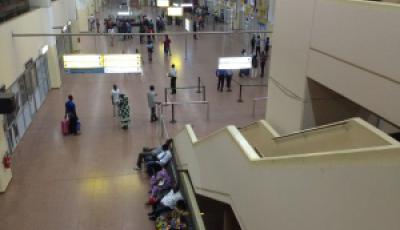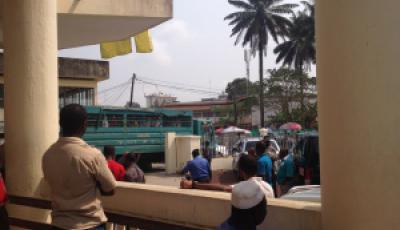Illegal at Home: Are Deportees and Non-Admitted Travellers Criminalized in their Countries of Origin?
Posted:
Time to read:
Guest post by Dr Maybritt Jill Alpes, a ‘Migration Law as Family Matter’ researcher at the VU Amsterdam. Jill’s research combines anthropology with law focusing on different aspects of the governance of migration. She has recently published on consulate officers in Social and Legal Studies, migration aspirations in Identities and flows of information on migration risks in African Diaspora. In this post, Jill investigates how migration control in Europe changes the position of foreign-nationals vis-à-vis their own state authorities. You’re invited here to contribute to the discussion on the insecurities and threats that deportees and non-admitted travellers face upon landing at the airport of their country of nationality.

From November 2013 to January 2014, I regularly went to the police post at the airport in Douala. As much as possible, I tried to talk with travellers who returned involuntarily to Cameroon and were now waiting at the police post to be allowed to leave the airport. Usually, the police post would fill up overnight with at least four or five people. These were deported migrants, participants in (voluntary) return programmes, or what in airport jargon is referred to as ‘non-admissables.’ People in this last category had successfully gone through the different exit controls at Douala airport and had flown to their respective destination, but were then rejected as ‘non-admissables’ by immigration officers at the airport of their destination. Immigration officers at control posts at airports of destination can refuse entry to travellers on suspicion of fraud, as well as on more formal grounds, such as a disrespect of a specific regulation concerning overlays or insufficient documentation to prove means of subsistence during travel. Since the introduction of carrier sanctions in Europe in the 1980s, airline companies are responsible for immediately returning to the country of origin―at their own expense―those passengers not admitted upon arrival.

As a deportee, Miranda wasn't put into prison. She did, however, have to spend three nights and three days in preventive detention upon arrival to Cameroon, the country of her nationality. During three days in detention at the airport of Douala, Miranda was allowed to wash herself once. She was able to eat because her sister brought her food. Miranda told me how a female police officer lent her a private phone so that she could call her sister: ‘[My sister] was doing all the negotiations. Otherwise I believe they would have sent me to prison.’ After three days, the police commissioner asked Miranda’s sister for the equivalent of €1,000 for her release. Her sister first brought the equivalent of €300 and later added another €150. Miranda refused to buy an additional bottle of whiskey to encourage the release of her passport. With another €10, Miranda was eventually able to retrieve her passport a few weeks after her release.
Miranda and Robert had to negotiate their exit from the airport and prison with police officers and judges who considered it an important part of their work to combat fraud. The European Union and its member states are involved in this combat against fraud by mobilizing migration and development funds to finance civil registry reforms and police training. Furthermore, France, for instance, has two international liaison officers in Cameroon, who amongst others regularly patrol both the international airport of Douala and Yaoundé. When I interviewed these liaison officers, neither showed an interest or awareness of how Cameroonian state actors receive national deportees or not-admitted travellers upon their return. Their priority lay with the confiscation of fraudulent French civil registry documents.
The Cameroonian case raises important questions with regards to how deportation and non-admission in the European Union can transform relations between involuntarily returning third-country nationals and authorities in emigration countries. What happens to deportees and non-admitted travellers upon their return from Europe to their countries of nationality? How do police officers in emigration countries receive these ‘failed’ travellers? What are the responsibilities of the European Union and its member states when collaborating with police forces of emigration countries?
In the follow-up of research findings in Cameroon, a group of colleagues and students from Sciences Po Paris and the VU Amsterdam set up a collaboration to better investigate the human insecurities that deportees and non-admitted travellers can face in the hands of state authorities upon return to the countries of their nationality. The project is exclusively concerned with direct air travel between emigration countries and EU member states. In particular, we seek address the following questions:
- In which countries are (i) deportees and/or (ii) non-admitted people subjected to (a) monetary extortions, (b) threats of imprisonment, and/or (c) imprisonment upon arrival at the airport of their country of nationality?
- Which emigration countries prosecute their nationals for having attempted to emigrate illegally?
Findings of this collaborative project will be presented at two events in Brussels in May 2015. In the meantime, I welcome any comments, feedback, and recommendations for sources. You may contact me via email, but please feel free to provide your feedback in a comment to this post so it's available to others who may also be interested in it.
Any comments about this post? Get in touch with us! Send us an email, or post a comment here or on Facebook. You can also tweet us.
__________
How to cite this blog post (Harvard style): Alpes, M J (2014) Illegal at Home: Are Deportees and Non-Admitted Travellers Criminalized in their Countries of Origin? Available at: http://bordercriminologies.law.ox.ac.uk/deportees-non-admitted-travellers/ (Accessed [date]).
Share:








